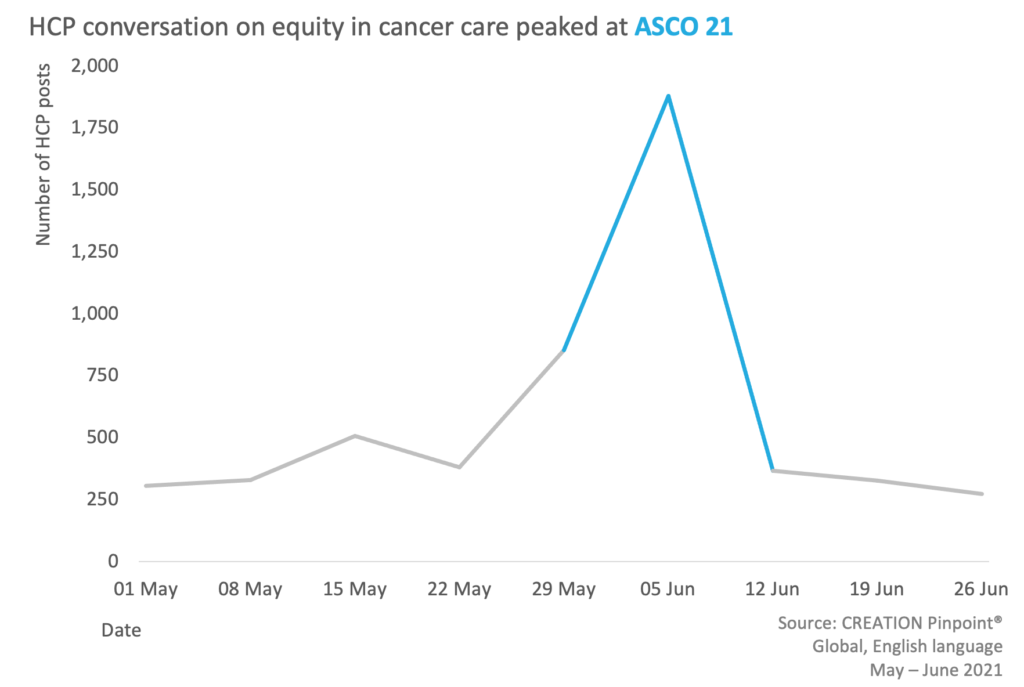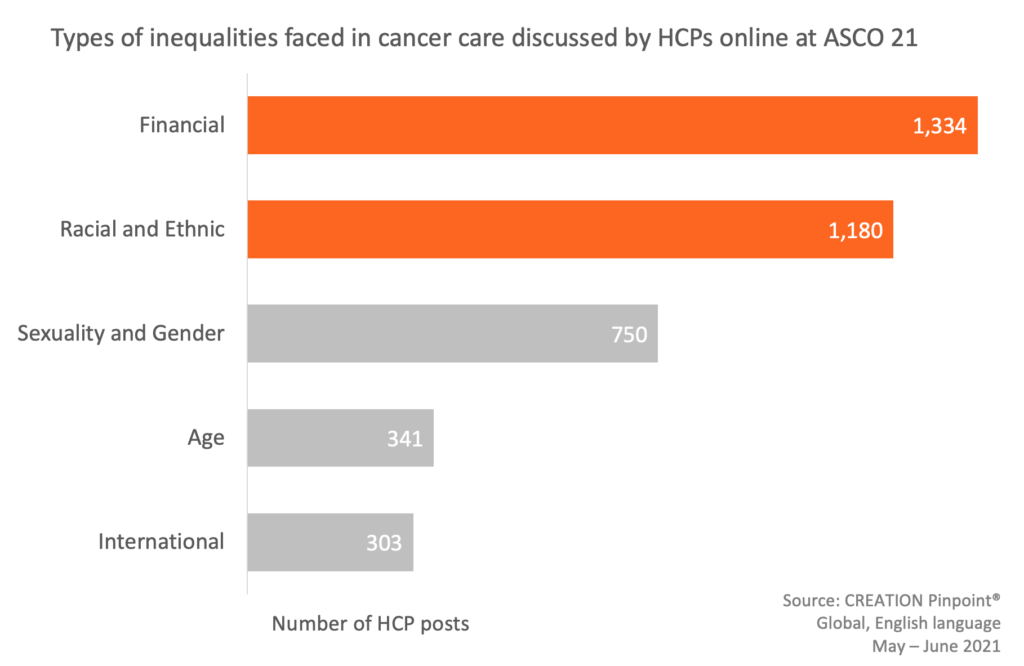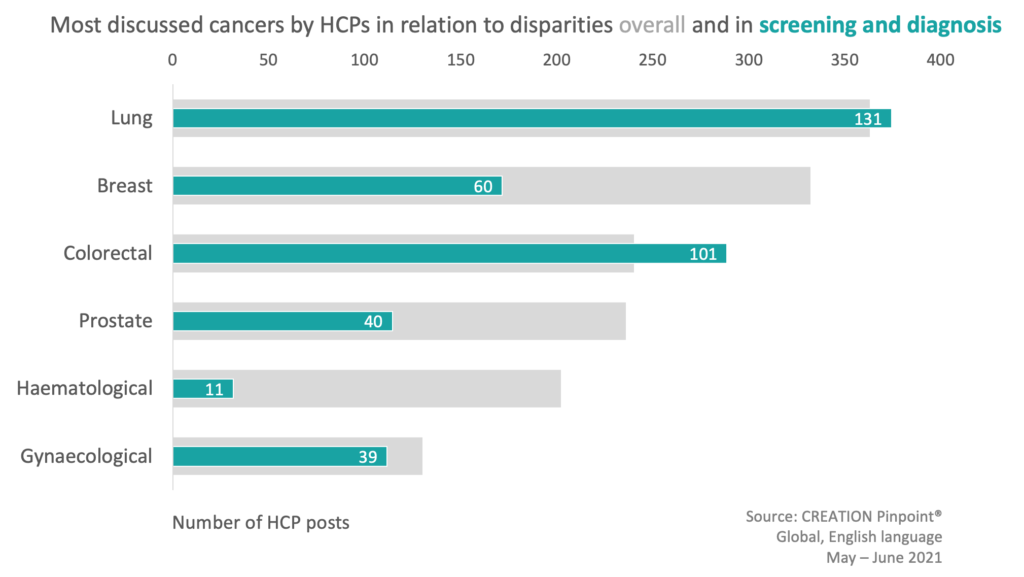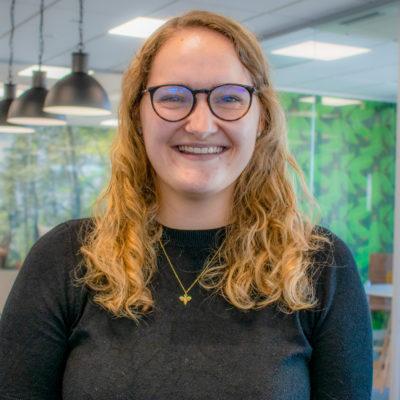This article was first published on Pharmaphorum as part of our What HCPs Think series.
After more than a year of COVID-19 dominating health conversations, HCPs have been engaging in dialogue about continually evident disparities that many are facing in healthcare. The topic rose to significance in the American Society of Clinical Oncology (ASCO) whereby they updated their mission statement in 2020 to “Conquering cancer through research, education, and promotion of the highest quality, equitable patient care.” Further, ASCO President Lori J. Pierce, MD, FASTRO, FASCO selected the theme for the 2021 Annual Meeting: ‘Equity: Every Patient. Every Day. Everywhere.’
While a theme constantly raised by HCPs advocating for their patients, the focus heightened in HCP online conversations at this ASCO’s 2021 virtual congress.

In her presidential address to open the virtual event, Lori J. Pierce, MD said “Eliminating racial and socioeconomic disparities in cancer outcomes has been a personal long-term commitment […] but clearly today it is even more relevant than ever—since the pandemic has disproportionately affected people of color and institutional racism is finally being recognized as a societal plague that is devastating to all of us.”
Captured among HCP conversations was data from studies whose aim was to define the extent of disparities experienced across various groups as well as the input of organisations, including pharmaceutical companies, to advocate for, raise awareness and financially support these causes.
While ASCO’s president primarily addressed the issue of racism and ethic inequalities in cancer care, the discourse from the wider event reflected a variety of inequities. Financial barriers and disparities emerged as the most discussed issue.

Areas of disparity
Affordability
Financial disparities were the most frequently discussed hurdle for patients seeking cancer care, in over 1,000 HCP posts. Over 40% of those posts cited insurance companies alongside these access issues.
Why do I need to fight insurance companies on everything my cancer patients need? I’m tired team.
— Shikha Jain MD, FACP (@ShikhaJainMD) June 29, 2021
Returning to the presidential address, HCPs concentrated on racial asymmetry in insurance coverage in the US, even despite the implementation of the Affordable Care Act (ACA). Alongside others, radiation oncologist Fumiko Ladd Chino, demanded more understanding and the addressing of social determinants of health (SDoH).
#ASCO21 @ASCO @ASCOPres reminds us that #healthequity cannot improve without increasing #access to care for our patients. Black pts REMAIN more likely to be UNINSURED than white pts even after the implementation of the #ACA. Understanding (and addressing) the #SDoH is essential. pic.twitter.com/3icILwxKB9
— Fumiko Ladd Chino, MD (@fumikochino) June 5, 2021
Beyond monetary concerns, each of the inequalities listed above affects various aspects of a patient’s journey. From before diagnosis with check-ups and screening to trial enrollment to assess drug efficacy, we will explore how HCPs discuss this aspect of cancer care.
Screening and Diagnosis
It is known that inequalities exist across entire health systems, affecting patients throughout their journeys from screening and diagnosis to treatment expenses. HCPs shared their experiences and opinions on these obstacles, in various cancer types. Lung cancer arose as the most discussed diagnosis, a prominence which proportionally increased when in relation to screening and testing.

HCPs were able to circulate data giving evidence to specific areas of imbalance in cancer care. One such example is Dr Loretta Erhunmwunsee, a thoracic surgeon in California, who led a review on racial and socioeconomic disparities in lung cancer screening. The study identified consequences including higher mortality rates among disadvantaged individuals.
Thx @montypal.
Proud to share our work in @CAonline. We identify several steps along the lung cancer screening (LCS) pipeline where Black and low SES individuals miss the benefits of LCS, resulting in increased mortality. #healthequity https://t.co/ZYwKEZ26WN https://t.co/6hFhvbpqhE pic.twitter.com/nOOIPjuK39
— Loretta Erhunmwunsee, MD, FACS (@LorettaEMD) May 24, 2021
Congress season comes with a myriad of new product approvals and expansions, with no exception in the lung cancer landscape. Upon the approval of Amgen’s sotorasib (Lumakras), HCPs took the opportunity to highlight the need for all patients to receive next-generation sequencing (NGS) at diagnosis to identify targets required for personalised treatment. While new pharmaceutical products are being continually innovated and approved, online reactions bring to the forefront the reality that there remains to be patients who are unable to access these lifesaving drugs.
With FDA approval of #sotorasib there are 9 targets with proven therapies in #NSCLC. Let us make sure that every patient gets NGS testing at diagnosis. @WinshipAtEmory @IASLC #LCSM @ASCO
— Suresh S. Ramalingam, MD, FASCO (@RamalingamMD) May 30, 2021
Clinical Trial Enrollment
Aside from testing to pinpoint patients suited to targeted therapies, HCPs discussed the need for more representation in clinical trials. Diversity in trial participants is necessary to determine the safety and efficacy of drugs in different groups as these can be affected by age, gender, ethnicity, weight and even nationality. Data shared by Dr Toni Choueiri, as presented at #ASCO21, showed that black patients were significantly less likely to be treated in clinical trials.
Important presentation by Dr. Debora Bruno @UHhospitals highlighting racial disparities in NGS testing and enrollment in clinical trials!! Need more efforts to ensure equal access to quality care!! #ASCO21 @ASCO @OncoAlert @montypal @PGrivasMDPhD@ASCOPost @ASCO_pubs pic.twitter.com/ytMAXSg3Xf
— Toni Choueiri, MD (@DrChoueiri) June 4, 2021
Further, Dr Shaalan Beg, posted an infographic detailing the root of this problem originating in an underrepresentation of black physicians in cancer care. ASCO’s snapshot showed that while comprising 13.4% of the US population, only 3% of oncologists are black. Another oncologist viewing these statistics said this was an “issue that we all must recognise and try to address”.
Great infographic by @ASCO_pubs
Black physicians are underrepresented in the oncology workforce. this directly impacts clinical care and causes disparity in clinical trial access/enrollment.https://t.co/ycEpuqfSwd pic.twitter.com/7temul6kns
— Shaalan Beg MD MBA FASCO (@ShaalanBeg) May 19, 2021
Patient Experience
Social media is often home to conversations between HCPs and patient advocates, as well as a place where physicians can anonymously share patient stories, publicising successes and disappointments alike. During the virtual event, various patient advocates offered their viewpoints, including Dr Jacqueline Smith who is a melanoma survivor. Her session was posted by the likes of thoracic oncologist Devika Das, MD who called out stereotyping around skin cancer risk for those with darker skin.
Don’t presume 🛑 Don’t stereotype 🛑 Amazing story of a patient advocate Dr.Smith who is a survivor of stage 3 melanoma. Patients with dark skin are at risk for skin cancers as well!🙏🏽💖#ASCO21
📍On a similar note,women get lung cancer too ( let’s remember that as well) #Equity pic.twitter.com/bJxhMx19cT— Devika Das, MD, MSHQS (@DevikaDasMD) June 5, 2021
Oftentimes, HCPs are a crucial advocate for their patients, no less Mark Lewis, MD who uses his platform to call out barriers patients face at the hand of insurance companies. This post alone received considerable engagement and responses from other HCPs who had experienced similar events when seeking coverage for their patients.
WHAT'S WRONG WITH AMERICAN HEALTHCARE, A ONE-ACT PLAY
Me: hi, I'd like an abdominal scan for my patient please
Insurance company: you can scan the pelvis
Me: but the problem is in the pancreas
Insurance company: you can scan the pelvis
Me: …
Them: …#medtwitter #pancsm
— Mark Lewis (@marklewismd) June 3, 2021
Moving Forward
ASCO 2021 and beyond has advanced discourse about inequity in cancer care. From race and nationality to gender and sexual orientation, new data and lived experience has revealed the extent of these issues, and even how they have been exacerbated by the COVID-19 pandemic.
by 'gender' we mean ALL genders. Talk about underrepresentation in #cancer research! #LGBTQ + we will include in our @Lancet Commission (read: don't let the word "women" fool you- we are including all genders in terms of power, agency, equity, rights regarding cancer) #ASCO21
— Ophira Ginsburg (@OphiraG) June 6, 2021
In terms of changing practice, HCPs drew attention to (sometimes unconscious) biases that are present throughout many patients’ experiences. Raising awareness to challenge such biases and educating healthcare providers to avoid inequitable conduct have been cited as steps to better circumstances from the source.
When we talk about Cancer Survivors Day, let’s talk about how to improve #equity. Let’s talk how about to improve access. Let’s talk about how to listen and engage with patients. Let’s talk about how to eliminate bias….and then, let’s do something about it. #ASCO21 pic.twitter.com/ImigDcmpo6
— Eleonora Teplinsky, MD (@drteplinsky) June 7, 2021
Ultimately, this is an ongoing conversation and more than HCPs challenging their own practice, additional advancement should be expected at higher levels, from medical institutions, schools, and pharmaceutical and insurance companies. Nevertheless, the present discourse is reason to have hope for a brighter and more equitable future in cancer care, as well as to celebrate the strides already made.
#ASCO21 has come to a close, & I feel optimistic (as I always do after this @ASCO meeting) for the future of oncology & for our patients with cancer. I'm grateful to every patient who participated in clinical trials AND to those who wanted to but could not. 🙏
— Merry-Jennifer Markham, MD, FACP, FASCO (@DrMarkham) June 8, 2021
To understand the real-time unprompted views and opinions of healthcare professionals in any therapy area or health topic around the globe please get in touch, we’d love to help.
 By Mary Kangley
By Mary Kangley 

